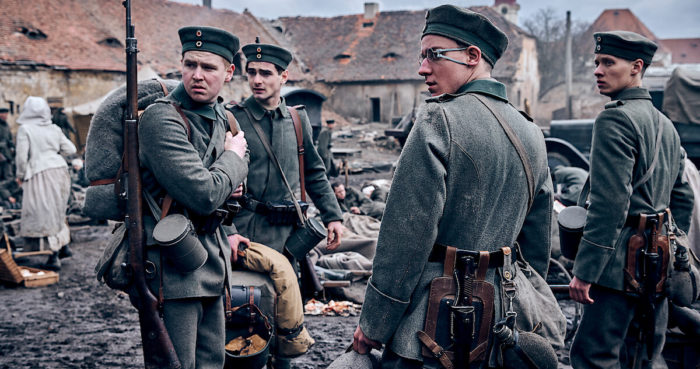
95th Academy Awards (2023)
Nominations: 9
Wins: We’ll see…
The most striking differences between the two cinematic adaptations of All Quiet on the Western Front stem from context. The 1930 version came out a long, long time ago. Back when World War I was called The Great War because WWII hadn’t happened yet. The “war epic” genre was not well-worn territory and there weren’t familiar tropes, in fact, All Quiet on the Western Front was the first talkie to win Oscars. On the other hand, the 2022 version is dripping with dramatic irony and historical context. It could crassly be dismissed as the latest attempt to give WWI its Saving Private Ryan, along with films like 1917 and Spielberg’s own War Horse. And it’s tempting to be dismissive of the remake for choosing the very 21st Century choice of playing up gore and omitting characterization. But that’s awfully pretentious and, like I said last time, there’s a war going on in Europe right now. This is important, come and see.

I don’t invoke Come and See lightly, I do it because that is definitely the target director Edward Berger was aiming for. Where the original movie (and presumably the novel) told the story of Paul and his class’ entire experience during the war, this version condenses most of the story as merely set-up for its new focus: the last days of the war. So we don’t see much of the new Paul (Felix Kammerer) before he has become as grizzled veteran, jaded for all the senseless violence. In place of frankly the bulk of the story, we get juxtaposition. The movie cuts between the action on the Western Front and something wholly new: the armistice negotiations in the Forest of Compiègne. This part of the story is led by Daniel Brühl as Matthias Erzberger, the real historical politician who signed Germany’s surrender (and was later assassinated for it, although that’s beyond the scope of this movie).
It’s an interesting choice and definitely one that made this adaptation closer to Paths of Glory in that it turned Paul and his fellow soldiers into helpless pawns forced into a meat grinder by feckless bureaucracy. 1930 Paul was tricked into the war by nationalism, quickly realized the conflict was meaningless, and lost all hope when he returned home and found he didn’t have a place there anymore because the war had changed him. 2022 Paul is more a blank slate, a poor man forced to suffer as powerful people toy with his life. That experience grows increasingly harrowing as the peace talks continue, because we get to see how futile the fighting is while it grows more violent. I will warn you that the further this story gets from the source material, the further it also gets from historical accuracy. But that’s all in service of making a greater impact (and winning some awards).

And that’s kind of where cinema is now, right? Audiences are savvy to the language of film. We can connect ideas with editing. We understand and believe in the maxim “show don’t tell,” so we don’t need scenes like in the original where Paul shouts at the heavens about his woes. And also… we have short attention spans now. We might tune out the negotiations if they weren’t intercut with shocking brutality. I’ll admit it: this is a German-language movie so I watched it with subtitles and even then I still looked at my phone a couple times. That’s how it is with Netflix movies! Is it not a worthy ambition for a remake to update a story for modern sensibilities? I walked away from the 1930 movie thinking WWI was a horrible, senseless stain on human history that destroyed the lives of even those who survived. With 2022’s version, it was more the basic “war is hell” but also the way WWI ended virtually guaranteed a WWII. Which is something audiences 92 years ago wouldn’t have been happy to hear.
Speaking of audiences, I’m not sure how much of one this version of All Quiet on the Western Front will have in the future if it doesn’t win that Oscar gold. I thought it was a harrowing, memorable experience but I bet it’s not one many people will seek out going forward unless it earns some greater prestige than a few BAFTAs. It’s not my favorite for best picture, but I guess I’m rooting for these people. I definitely will also be interested to see if we get any more from screenwriter Lesley Paterson, who went and had a whole career as a professional triathlete between starting on this project in 2006 and Netflix finally releasing it. A successful creative who’s also really good at something else? And she’s incredibly fit? I bet there are some salty men in some corner of the Internet who would have loved this movie but will never give it a chance.
